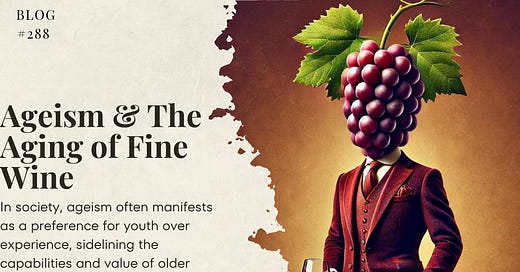In society, ageism often manifests as a preference for youth over experience, sidelining the capabilities and value of older individuals. This discrimination contrasts starkly with the revered process of aging fine wine, where time enhances the character and depth of the beverage, increasing its value and desirability. This blog explores the parallels between societal views on aging and the aging of fine wine, highlighting the disparities and lessons we can learn from oenology—the science of wine.
Understanding the Aging of Fine Wine
The aging of fine wine is a celebrated process in viticulture, demonstrating that with time, wine can develop richer flavors, greater complexity, and smoother textures. Key factors in this process include controlled storage conditions, the quality of the vintage, and the type of grape. As wine ages, its flavors integrate and mellow, and its aroma becomes more sophisticated. The appreciation of aged wine is based on the understanding that maturity brings irreplaceable qualities that are not present in younger wines.
Parallel to Ageism in Society
Unlike the appreciation for aged wine, ageism in society often reflects an unjust preference for youth, overlooking the depth of experience, wisdom, and stability that older individuals bring. This bias can manifest in the workplace, in media representation, and even in everyday interactions, where the contributions of older adults are undervalued or ignored.
Underappreciation of Experience: Just as aged wine is treasured for its rich flavors and complexity, the accumulated experiences and knowledge over a lifetime are invaluable. These contribute to a deeper understanding and more strategic thinking across various contexts, from professional environments to community and familial interactions. At times, prioritizing long-term value may require a company to accept short-term financial compromises to sustain progress and integrity.
Misconceptions of Aging: Society often misconstrues aging as a decline in vitality and relevance, like how some might mistakenly view all old wines as outdated or spoiled, not recognizing that many wines are crafted to reach their peak in flavor and quality much later.
Discarding Potential: Just as a prematurely opened vintage might fail to express its full potential, the premature sidelining of older individuals prevents society from benefiting from their full potential.
Drawing Parallels Between Aging Wine and Combating Ageism
The process of aging fine wine offers valuable lessons in how we perceive and value aging in humans:
Value of Patience and Long-term Perspective: Just as fine wines improve and gain value over time under the right conditions, individuals can continue to grow and contribute significantly as they age, provided they receive respect and opportunities to remain active participants in society.
Celebration of Depth and Complexity: The complexity of aged wine is a direct result of its maturity, a quality that should be equally celebrated in people. The depth of experience and the broad perspective that older individuals offer can enhance decision-making processes and cultural richness.
Rejecting Simplistic Judgments: Just as connoisseurs understand that not all wines age similarly and that each vintage has its unique trajectory, society should recognize the diverse capabilities and needs of older adults, avoiding one-size-fits-all judgments.
Conclusion
The disparity between how society treats aging in humans versus in wine highlights a critical area for reflection and change. By embracing the lessons from the aging of fine wine, we can foster a more inclusive society that values the contributions and potential of its older members. Let us learn to celebrate aging as a process of enrichment and transformation, where everyone, like each vintage, is given the opportunity to reach their fullest expression.
The disparity between how society treats aging in humans versus in wine highlights a critical area for reflection and change. Notably, even as two of the presidential candidates in the 2024 upcoming election are over the age of 78. This important role in the United States has significant responsibilities and capabilities for someone at an advanced age. Yet society as a whole still often practices ageism for the population. This contradiction underscores the need to challenge our perceptions and to value the contributions and potential of older individuals more broadly.
By embracing the lessons from the aging of fine wine, we can foster a more inclusive society that appreciates the rich experiences and wisdom that come with age. Let us learn to celebrate aging as a process of enrichment and transformation, where everyone, like each vintage, is given the opportunity to reach their fullest expression. This approach not only enriches our communities and workplaces but also ensures that everyone (not just our Presidents), regardless of age, feels valued and respected in every aspect of life.




